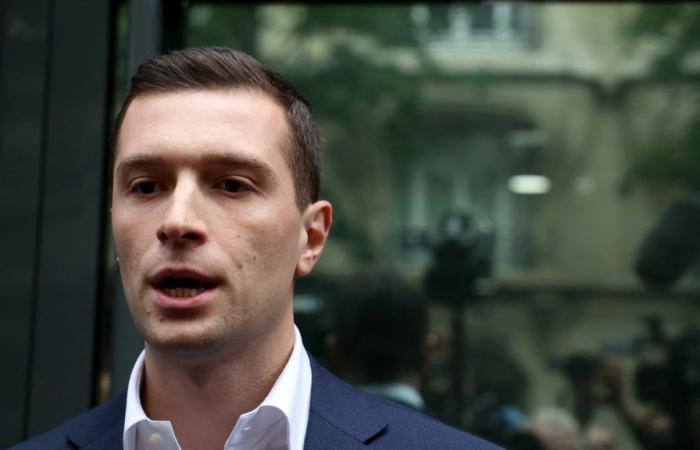Estimated by the National Rally itself at 12 billion euros per year (rather 17 billion by Bercy), the reduction of VAT to 5.5% would come up against numerous obstacles but above all would widen the deficits even further.
An amended program like Giorgia Meloni in Italy obliged once in power to go back on her expensive electoral promises? Or a budget bomb like Liz Truss in the United Kingdom forced to resign 44 days after arriving at 10 Downing Street?
The new program of the National Rally (RN), the broad outlines of which were revealed this Thursday, seems to navigate between the two. If the party which aims to govern the country on the evening of July 7 has watered its wine in relation to the 2022 presidential program, certain measures remain priorities.
Thus, if the hypothetical pension reform, the cost of which is estimated at 27 billion euros per year (two and a half times the Justice budget) by the Montaigne Institute, is postponed until 2026 at best, a flagship measure concerning the purchasing power remain more relevant than ever: the reduction in VAT on energy.
“The economic, budgetary and financial situation of the country is in a catastrophic state. Before getting back on track, we must put an end to the slide into which the Macronists have led us,” explained Jordan Bardella on BFMTV this Friday .
He assured that his priority, if he becomes Prime Minister, will be “purchasing power by lowering VAT”.
A drop to 17 billion euros
Concretely, this would involve reducing the level of VAT from 20% to 5.5% on all energy products, namely electricity, gas, fuel and fuel oil.
A measure which had been estimated at 10.3 billion euros in 2022 by the Montaigne Institute. Based on 2018 data, economists calculated that VAT on these products brought in nearly 15 billion euros to the state coffers. By dividing it by three, revenue would therefore be reduced by two thirds.
But by the admission of Renaud Labaye, the secretary general of the RN group in the Assembly, the measure would cost even more since he estimates it at 12 billion euros.
In fact, it would be even more. With inflation, energy products have increased sharply, as have VAT revenues. This surplus was also dedicated to financing anti-inflation measures put in place between 2021 and 2023 (price shields, rebates at the pump, etc.), the amount of which is estimated at 100 billion euros.
The rise in raw material prices over the last three years has had the effect of driving up energy prices and therefore mechanically inflating VAT revenues which amount to more than 50 billion euros in 2023. The decline at 5.5% would therefore constitute, according to Bercy’s calculations, a shortfall of 16.8 billion euros in the State Budget.
In detail, the cost would be 10 billion euros for fuels, 4.5 billion euros for electricity and 2.3 billion for gas.
Two major obstacles
These measures would then come up against two obstacles. Firstly legal since European texts do not authorize the application of reduced VAT rates on fuel (Annex III of a VAT directive). France is expected to begin a standoff with Brussels which is expected to last several years and could be subject to sanctions. Poland certainly implemented a reduced VAT rate in 2021, but it was a temporary five-month measure in a context of sharp increases in prices at the pump.
The second obstacle is economic. While the budget deficit rose to more than 150 billion euros in 2023 and the debt burden is expected to exceed 50 billion euros this year, how could this measure be financed without further widening the deficits?
On the side of the National Rally, we assure that the shortfall would be compensated by an increase in the consumption of energy products. In other words, the drop in prices at the pump would encourage the French to take their car more, for example.
An analysis that economists at the Montaigne Institute consider to be partly well-founded.
“The cost of this measure could be reduced by an increase in the consumption of energy products, following the reduction in taxation: increase in heating, reduction in eco-driving, car journeys favored compared to other transport , etc.”, they wrote in their 2022 note.
Very low adaptation of motorists
But this over-consumption would in fact be very marginal. This is what Francis Duseux, the former boss of Esso France, said in a parliamentary investigation in 2019.
“The answer can be found in the graph tracing the evolution of the consumption of petroleum energy products in France since 1972. We see that even when the price of oil fell to 30 dollars per barrel, fuel consumption almost did not increase. not changed,” he said.
A 2023 INSEE study confirmed that what we call the price elasticity of fuels (the propensity to consume more or less depending on the price) was in fact quite low and mainly concerned small riders, those who spend the least in fuel and therefore bring in the least tax revenue.






